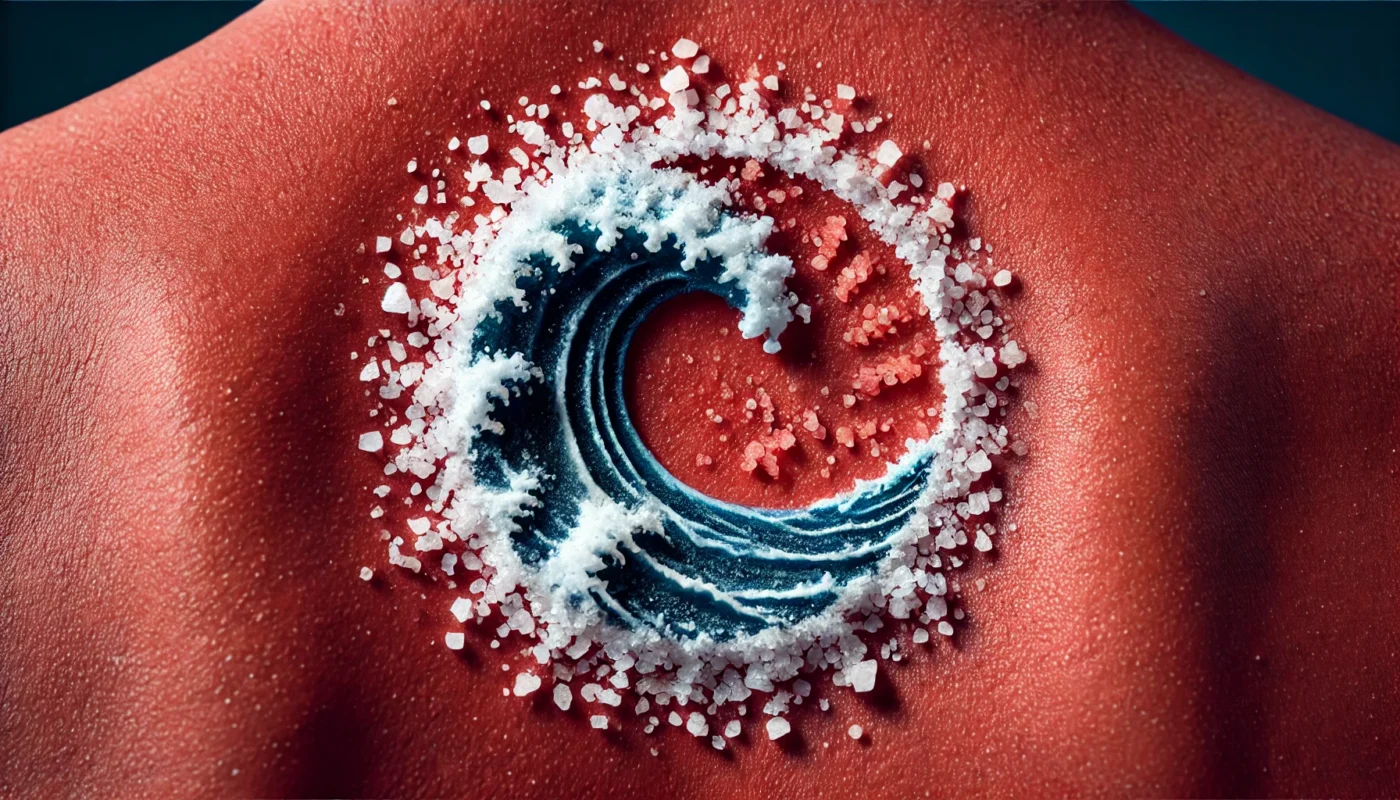The interplay between sunburn and salt water is a topic that often sparks curiosity and debate among beachgoers and health enthusiasts alike. Does salt water help sunburn, or does it exacerbate the condition? In this comprehensive exploration, we delve into the science behind these questions to provide a nuanced understanding of how salt water interacts with sunburned skin.
You may also like: Essential Tips for Sun Protection Daily
Understanding Sunburn and Its Impact
To fully comprehend the effects of salt water on sunburn, it’s crucial first to understand sunburn itself.
What is Sunburn?
Sunburn is an inflammatory response of the skin resulting from excessive exposure to ultraviolet (UV) radiation. This radiation can come from the sun or artificial sources like tanning beds. When the skin is exposed to these UV rays for extended periods, the DNA in skin cells is damaged, triggering an inflammatory response.
This response leads to the classic symptoms of sunburn: redness, pain, and swelling. In severe cases, blisters and peeling can occur as the body attempts to rid itself of damaged cells. The severity of a sunburn depends on several factors, including skin type, the intensity of sun exposure, and the duration of exposure.
The Biological Impact of Sunburn
On a biological level, sunburn is more than just a surface injury; it affects skin cells at the DNA level. The damage to the DNA can trigger apoptosis, or programmed cell death, leading to peeling as the body sheds damaged skin cells. This process is part of the skin’s natural healing mechanism.
In addition to the immediate physical symptoms, repeated sunburns can have long-term effects, including premature aging of the skin and an increased risk of skin cancer. This makes effective management and prevention of sunburn critical.
Treatment Goals for Sunburn
The immediate goal of sunburn treatment is to alleviate pain and prevent further damage. This involves several strategies:
- Cooling the Skin: Applying cool compresses or taking a cool bath can help reduce skin temperature and soothe inflammation.
- Maintaining Hydration: Sunburn draws fluid to the skin’s surface and away from the rest of the body, so it’s essential to drink extra fluids to prevent dehydration.
- Protecting the Affected Area: Wearing loose, soft clothing and staying out of the sun can prevent further damage to already compromised skin.
Salt Water: A Natural Healer or Irritant?
Salt water’s effects on sunburn are multifaceted, and understanding the science behind it is key to determining whether it’s beneficial or harmful.

The Composition of Salt Water
Salt water, particularly sea water, contains a myriad of minerals such as sodium, chloride, magnesium, and sulfate. Each of these components can potentially influence skin health.
- Sodium Chloride: Common table salt, or sodium chloride, can have a drying effect on the skin. While it may help in cleansing the wound, it can also strip away natural oils, potentially exacerbating dryness and irritation. This can lead to increased discomfort, especially on already sensitive, sunburned skin.
- Magnesium: Found in higher concentrations in sea water, magnesium has anti-inflammatory properties that might soothe irritated skin. It is known to enhance skin barrier function and hydrate the skin, potentially providing relief to sunburned areas.
- Sulfate: This mineral can support detoxification processes in the body and may help in healing skin lesions. Sulfates in sea water can assist in the repair of damaged skin cells, offering potential benefits to sunburned skin.
Salt Water’s Effects on Sunburn
The effects of salt water on sunburn can be both beneficial and detrimental, depending on several factors.
Potential Benefits
Some proponents of natural remedies suggest that salt water might help sunburn due to its antiseptic properties. The minerals present in sea water can potentially aid in reducing inflammation and promoting healing.
- Antimicrobial Action: Salt water is known for its ability to cleanse minor wounds and cuts, possibly preventing infections in sunburnt areas. The salt can help eliminate harmful bacteria that might otherwise exacerbate the sunburn.
- Mineral Benefits: Magnesium and sulfate can contribute to soothing and healing the skin by reducing inflammation and supporting skin repair. These minerals are believed to enhance the skin’s natural healing processes, potentially reducing the severity of sunburn symptoms.
Potential Drawbacks
Despite the potential benefits, there are significant considerations to keep in mind:
- Irritation and Dryness: The drying nature of salt can exacerbate the peeling and irritation associated with sunburn. Overexposure to salt water can strip the skin of necessary moisture, leading to increased discomfort. This can make the skin feel tight and itchy, prolonging the healing process.
- Sensitivity: Sunburned skin is highly sensitive, and the salt can cause a stinging sensation, further aggravating the pain and discomfort. This sensitivity can vary from person to person, making salt water a potentially uncomfortable remedy for some.

Practical Tips for Managing Sunburn
Given the mixed effects of salt water on sunburn, here are some practical tips for managing sunburn effectively:
Immediate Care
- Cool Compresses: Apply cool, damp cloths to the sunburned area to help reduce inflammation and heat. This can provide immediate relief from the burning sensation associated with sunburn.
- Moisturize: Use a gentle, fragrance-free moisturizer or aloe vera gel to hydrate the skin and provide a cooling effect. Aloe vera, in particular, is known for its soothing properties and can help alleviate sunburn pain.
- Hydration: Drink plenty of fluids to stay hydrated and support skin recovery. Proper hydration aids in skin repair and can help the body recover more quickly from the effects of sunburn.
When to Use Salt Water
If you choose to expose sunburned skin to salt water, consider the following:
- Moderation: Limit the time spent in salt water to prevent excessive drying of the skin. Short, infrequent swims may provide some benefits without over-drying the skin.
- Rinse Off: After a dip in the ocean, rinse the skin with fresh water to remove salt residues and apply a moisturizer to lock in hydration. This can help mitigate the drying effects of salt water and protect the skin’s natural barrier.
Alternative Natural Remedies
If salt water proves too harsh for your sunburn, consider these alternative remedies:
- Oatmeal Baths: Colloidal oatmeal can soothe irritated skin and relieve itching. Adding oatmeal to a cool bath can provide relief from sunburn symptoms and promote healing.
- Cucumber Slices: Cucumber has cooling properties and can reduce swelling and redness when applied directly to the skin. This natural remedy is gentle and can provide soothing relief to sunburned areas.
- Green Tea Compresses: Green tea has antioxidant and anti-inflammatory properties that may help soothe sunburn. Applying cooled green tea bags to affected areas can reduce redness and inflammation.

Conclusion: To Swim or Not to Swim?
Salt water’s effects on sunburned skin are not straightforward and can vary from person to person. While it offers certain healing properties due to its mineral content, it can also pose risks of irritation and dryness. It’s crucial to weigh these factors and consider personal skin sensitivity when deciding whether to expose sunburned skin to salt water.
Ultimately, managing sunburn involves a combination of soothing, hydrating, and protecting the skin. By following the practical tips provided here, you can help ensure your skin heals comfortably and effectively from sunburn. Remember, prevention is key—always use sunscreen and protective clothing to minimize the risk of sunburn in the first place. Taking these precautions can help you enjoy the sun safely and avoid the discomfort of sunburn.
Further Reading:
I Got Blisters From a Sunburn. What Should I Do?
sunburn, salt water, sea water, skin care, natural remedies, skin healing, sun protection, hydration, anti-inflammatory, beach health.
Important Note: The information contained in this article is for general informational purposes only, and should not be construed as health or medical advice, nor is it intended to diagnose, prevent, treat, or cure any disease or health condition. Before embarking on any diet, fitness regimen, or program of nutritional supplementation, it is advisable to consult your healthcare professional in order to determine its safety and probable efficacy in terms of your individual state of health.
Regarding Nutritional Supplements Or Other Non-Prescription Health Products: If any nutritional supplements or other non-prescription health products are mentioned in the foregoing article, any claims or statements made about them have not been evaluated by the U.S. Food and Drug Administration, and such nutritional supplements or other health products are not intended to diagnose, treat, cure, or prevent any disease.

